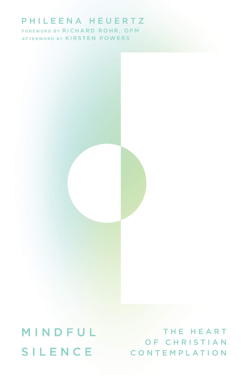
As has become a July tradition at The Well, we have the opportunity to share excerpts of a book we enjoyed this year.
We settled on Mindful Silence: The Heart of Christian Contemplation by Phileena Heuertz because of its invitation to spiritual growth through the practice of contemplative prayer. Her own experience with this practice came after years of Christian work in developing countries, and an inability to reconcile what she witnessed in the world with “what I had learned about God growing up in the Protestant pews of Indiana.” Contemplative prayer became a new way of relationship with God.
While the work to which you are called might not look like hers, might you resonate with the sense of weight of responsibility, important problems which you are not able to fully solve on your own, and a general exhaustion? This invitation to contemplative prayer offers a way forward when you’re not sure what to make of your faith anymore.
We hope the introduction to Mindful Silence is meaningful for you too. Come back each Thursday in July for another glimpse into this book!
— Andrea Bridges
Contemplative Spirituality
by Phileena Heuertz, excerpted from Mindful Silence: The Heart of Christian Contemplation
 Contemplative spirituality is a way of seeing. The English word “contemplation” comes from the Latin contemplatio, which means to look at, to gaze attentively, to mark out a space for observation. Contemplative practices are those that create margin to pay attention to and observe our life. This assumes we have determined to take responsibility for ourselves. It involves some introspection—not for the sake of inner knowledge, but for the sake of living a more skillful life. With self-awareness comes greater understanding of our pain and the way we cause suffering. Contemplative prayer offers an antidote. Through contemplation we find alleviation of our personal suffering, and we discover how to minimize our infliction of suffering on others.
Contemplative spirituality is a way of seeing. The English word “contemplation” comes from the Latin contemplatio, which means to look at, to gaze attentively, to mark out a space for observation. Contemplative practices are those that create margin to pay attention to and observe our life. This assumes we have determined to take responsibility for ourselves. It involves some introspection—not for the sake of inner knowledge, but for the sake of living a more skillful life. With self-awareness comes greater understanding of our pain and the way we cause suffering. Contemplative prayer offers an antidote. Through contemplation we find alleviation of our personal suffering, and we discover how to minimize our infliction of suffering on others.
This requires effort and patience. So, we take up a contemplative practice to make regular time for this critical observation of reality. Contemplative practices are held by postures of solitude, silence, and stillness. In solitude, we develop the capacity to be present. In silence, we cultivate the ability to listen. And in stillness we acquire the skill of restraint or self-control.
Christian mystics have always held that silence is God’s first language. It’s unfortunate we are not more acquainted with this language. Silence is consciousness itself, the Source of all that is. The heart of Christian contemplation beats with silence and expands our consciousness.
Life happens. It’s out of our control. What is in our control is how we respond. A commitment to contemplation is an agreement to take responsibility for actions and relationships. Religious teaching tries to awaken us to such accountability.
One of my favorite spiritual teachers, Father Thomas Keating (hereafter referred to as Father Thomas). He introduced me to the Christian contemplative tradition many years ago, and my life has never been the same. I’ll never forget how he said, “If you stay on the spiritual journey long enough, the practices that sustained your faith will fall short. When this happens, it can be very disillusioning. But if we stay on the journey, we find out that this is actually an invitation to go deeper with God.”
*Taken from Mindful Silence by Phileena Heuertz. Copyright (c) 2018 by Phileena Heuertz. Published by InterVarsity Press, Downers Grove, IL. www.ivpress.com
If you enjoyed this excerpt, consider purchasing Phileena's book using the 40% off discount code (including free US shipping) that InterVarsity Press is offering readers of The Well: WELL4649
. (Good through September 30, 2019 on the title Mindful Silence.)